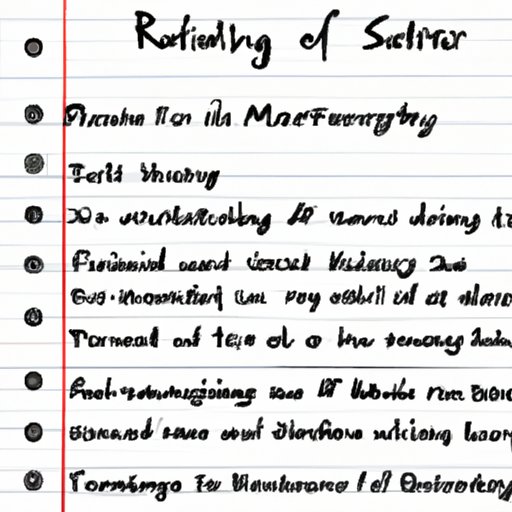Introduction
Writing an autobiography is a great way to document your life story and share it with others. An autobiography is a written account of your life, told from your own perspective. It typically covers all aspects of your life, from childhood to adulthood, and focuses on the events that have shaped you into who you are today.
People write autobiographies for many different reasons. Some choose to document their life story to share with family members, while others may use it as a creative outlet or form of self-expression. No matter what your motivation, writing an autobiography can be an extremely rewarding experience.
How to Start Writing Your Autobiography
Getting started on your autobiography can seem like a daunting task. However, with a little bit of planning and brainstorming, you can easily begin your journey to documenting your life story. Here are some tips to help you get started:
Write Down Key Memories From Your Life
The first step in writing your autobiography is to identify significant memories from your life. Think about important moments that have shaped who you are today. These could be moments of joy, sadness, triumph, or failure. Write down each memory so you can refer back to them later.
Write The Story Of Your Life In Chronological Order
Once you’ve identified key memories from your life, the next step is to organize them into a timeline. Start by writing down the major events of your life in chronological order. This will help you to create a structure for your story and make it easier to write.
Brainstorm Questions To Help You Write Your Autobiography
As you go through the process of writing your autobiography, you may find yourself stuck at certain points. To help you think through these blocks, try asking yourself a few questions. For example, why did this event happen? What did I learn from this experience? How has this moment changed me? Answering these questions can help you gain a deeper understanding of your life story and move forward in the writing process.
Jot Down A List Of People Who Influenced Your Life
Think about the people in your life who have had the most influence over you. These could be family members, friends, teachers, mentors, or even celebrities. Jot down a list of these people and how they have impacted you. This information can help you form stronger connections between your memories and the people who helped shape them.
Make An Outline Of Your Autobiography
Creating an outline of your autobiography is a great way to organize your thoughts and prepare for the actual writing process. Begin by dividing your life story into distinct sections, such as childhood, teenage years, adulthood, etc. Then, break each section down further into subsections, such as specific memories or lessons learned. With an outline, you have a roadmap to follow as you write your autobiography.
Focus On One Event Or Period Of Your Life At A Time
When writing your autobiography, it’s easy to get overwhelmed by the sheer amount of material you have to cover. To make the process easier, try focusing on one event or period of time at a time. This will help you stay organized and prevent any feelings of being overwhelmed. As you write, you can slowly build up to the bigger picture.
Conclusion
Writing an autobiography can be a powerful and rewarding experience. By following the steps outlined above, you can get started on your journey to documenting your story. Remember to focus on key memories, create a timeline of your life, ask yourself questions, make a list of influential people, and create an outline. With a little bit of planning and dedication, you can soon have a finished autobiography to share with the world.
(Note: Is this article not meeting your expectations? Do you have knowledge or insights to share? Unlock new opportunities and expand your reach by joining our authors team. Click Registration to join us and share your expertise with our readers.)
